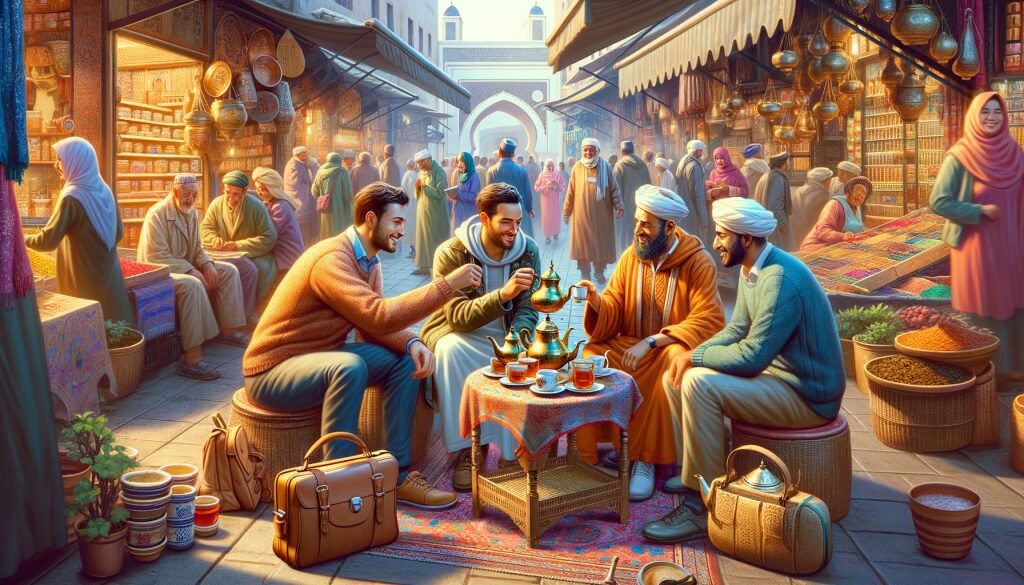Morocco presents a mosaic of dynamic cultures, winding medinas, and stunning scenery. As a visitor, balancing enthusiasm with respect is essential. To foster enriching experiences and avoid cultural missteps, heed the following guide to seven tourist ‘don’ts’ in the captivating kingdom of Morocco. This ensures that your visit honors the local customs and supports sustainable tourism in this North African treasure.
- Avoid Disrespectful Dress Codes
Navigating Morocco’s varied landscapes, from vibrant markets to tranquil mosques, warrants conservative attire as a gesture of respect. Women are advised to cover shoulders and knees, and men should eschew tank tops and shorts. Despite the enticing warmth of the Moroccan climate, maintaining modest dress garners local esteem and facilitates cultural immersion, unhindered by cultural insensitivity.
Adopting local dress codes is not about forsaking personal style but embracing the cultural norms of the region. Clothing in Morocco is not just about fashion; it represents a deep-seated respect for tradition and social mores. By dressing appropriately, you are not only abiding by Morocco’s cultural standards but also safeguarding your own comfort when navigating through more conservative rural areas or religious sites.
- Don’t Ignore Local Customs
Local customs in Morocco are the invisible threads that bind Moroccan society. Greeting people with a gentle “Salaam Alaikum,” understanding the protocol during meals, and being mindful of the calls to prayer are just a few ways you can show respect. Ignoring these norms can not only isolate you from authentic experiences but may also offend those who uphold these traditions dearly.
Before visiting Morocco, it is crucial to acquaint oneself with its cultural norms. For instance, abstaining from public consumption of food, drink, or tobacco during daylight in Ramadan is expected of all, including non-Muslims. Adherence to such practices demonstrates respect and can enhance one’s engagement with and understanding of Moroccan culture.
- Never Refuse Mint Tea Offers
Mint tea in Morocco is not just a beverage; it’s a symbol of hospitality and friendship. Being offered a glass of tea is a gesture of welcome, and refusing it can be seen as a rejection of this warmth. Accept the tea graciously and enjoy the moment, for it is often accompanied by stories and laughter, paving the way to the heart of Moroccan culture.
The process of preparing and serving mint tea is a ceremonial practice and reflects the generosity of the host. Engaging in this tradition is a bridge to understanding local customs and creates an opportunity for cultural exchange. Remember, drinking mint tea is more than quenching thirst; it’s sipping on the essence of Moroccan conviviality.
- Skip Public Displays of Affection
While Morocco is a hospitable and open country, public displays of affection are not in tune with local social etiquette. Holding hands may be tolerated, but hugging, kissing, or other intimate gestures in public can make onlookers uncomfortable. It’s best to exhibit restraint and save such affections for private spaces.
This reserve in public extends to all forms of physical interaction, including between friends and family members. By keeping affectionate behavior private, visitors show respect for the conservative values that many Moroccans hold dear. This modest approach to public behavior is an integral part of harmonious coexistence with local communities during your travels.
- Don’t Haggle Without Tact
Haggling is an integral part of the shopping experience in Morocco’s souks, but it must be done with respect and patience. It’s a playful exchange, not a confrontation, so approach it with a sense of humor and light-heartedness. Remember that while haggling is expected, it’s also crucial to recognize the value of craftsmanship and the livelihood of vendors.
Begin with a bid below your maximum budget, ensuring it remains respectful. Express genuine regard for the product and the seller’s efforts. Effective negotiation is achieved when both buyer and seller are content with the deal. Remember, a slight price variation is often more significant to the seller than a tourist; hence, approach bargaining with fairness and empathy.
- Avoid Photographing People Secretly
Capturing the essence of Morocco through the lens can be tempting, but always ask for permission before photographing people. Secretly taking pictures is intrusive and can be seen as a violation of personal space. Many Moroccans, especially women and elders, are conservative about having their images captured, so respect their wishes if they decline.
Building rapport with your subject can sometimes lead to a more inviting photo opportunity. Offering to send them a copy of the photo as a gesture of goodwill often results in a positive response. Remember, photography should be an exchange, not a theft of a moment or an image against someone’s will.
- Never Desecrate Historic Sites
Morocco’s historic sites are the custodians of its rich past and should be treated with the utmost reverence. Never climb, deface, or remove any part of these treasures, as such actions can cause irreparable damage. Respect barriers and signs that are put in place to protect both the monument and its visitors. By preserving these sites, you’re contributing to the legacy of Moroccan history for future generations to appreciate.
Furthermore, consider the impact of your visit on the environment surrounding these sites. Avoid littering and be mindful of your carbon footprint. Opt for eco-friendly tours and support conservation efforts. Your responsible travel practices can play a part in sustaining Morocco’s historical and natural wonders for years to come.
Exploring Morocco is an adventure for the senses, filled with sights, sounds, and tastes that leave a lasting impression. However, traveling with cultural sensitivity is key to a fulfilling experience. By avoiding these seven ‘don’ts,’ you demonstrate respect for the country’s traditions and people, fostering a mutual appreciation that transcends borders. As a traveler, you have the opportunity to not only discover the beauty of Morocco but also to be an ambassador for thoughtful and responsible tourism.
Do you need more insights? Here is another article that will provide you with in-depth info about visiting Morocco.

